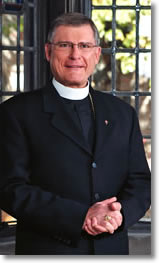by Rev. Jerry Kieschnick
 |
|
Rev. Dr. Gerald B. Kieschnick
|
How meaningful is the Lord’s Supper to you?
One of the articles in this issue of The Lutheran Witness focuses on Martin Luther and makes reference to the Large Catechism. Not very long ago, in my own study and reflection time, I reread portions of the Large Catechism that address the Lord’s Supper, Holy Communion, the Sacrament of the Altar. While I had previously read this material numerous times, I was once again moved by the many facets of this precious gift of God that our good friend Martin Luther shows us.
For example, Luther discusses the power and benefit of the Lord’s Supper. Here is some of what he says in the Large Catechism:
“Now we come to its power and benefit, the purpose for which the Sacrament was really instituted, for it is most necessary that we know what we should seek and obtain there. This is plainly evident from the words . . ., ‘This is My body and blood, given and poured out for you for the forgiveness of sins.’ In other words, we go to the Sacrament because we receive there a great treasure, through and in which we obtain the forgiveness of sins.”
A very specific memory comes to my mind in this regard. It goes all the way back to my experience as a brand-new eighth-grade confirmand at St. Matthew Lutheran Church in Houston, Texas.
The practice at my home church was for confirmation to be held on Palm Sunday, with first communion for the new confirmands to follow on Maundy Thursday. When the evening came for my class to receive the Sacrament for the very first time, joy was not the emotion I was experiencing. My clear recollection from my catechetical instruction was that I had better be absolutely certain that I was worthy and well prepared before walking down the aisle to the communion rail. So I approached the table of the Lord with fear and trembling, concerned and worried that I might not be adequately prepared or worthy. Adding to my concern and worry was the fact that my pastor had emphasized the possibility that an unworthy communicant could receive the Sacrament to his or her damnation.
Rather than the joy of forgiveness and the assurance of life and salvation, I focused on the fear factor of possible eternal perdition.
All this angst had come from my pastor’s strong emphasis on the apostle Paul’s words to the Corinthians: “Wherefore whosoever shall eat this bread, and drink this cup of the Lord, unworthily, shall be guilty of the body and blood of the Lord. But let a man examine himself, and so let him eat of that bread, and drink of that cup. For he that eateth and drinketh unworthily, eateth and drinketh damnation to himself, not discerning the Lord’s body. For this cause many are weak and sickly among you, and many sleep” (1 Cor. 11:27–30 KJV, emphasis mine).
My fears were exacerbated, if not initiated, by the translation of the word “damnation” in the King James Version, the one we used in our confirmation class. No other version of Scripture translates that word as “damnation.” All later translations are more faithful to the Greek in translating that word as “judgment.” The English Standard Version (ESV), for example, translates this sentence as follows: “For anyone who eats and drinks without discerning the body eats and drinks judgment on himself” (v. 29, emphasis mine). Verse 30 describes what that judgment is about, namely, weakness, sickness, and even death. But even in that temporal judgment, God spares the unworthy communicant from eternal condemnation: “But when we are judged by the Lord, we are disciplined so that we may not be condemned along with the world” (1 Cor. 11:32 ESV).
Fortunately, I did not remain in my state of fear and trembling. I came to understand that the Sacrament is for penitent sinners who desire the blessings that God offers through the body and blood of Christ—namely, the forgiveness of sins.
We also have come to understand through this and other texts that to commune in an unworthy manner means not realizing that Christ’s true body and blood are present in, with, and under the bread and wine; not desiring the forgiveness offered in the holy meal; not reconciling existing sinful offense; not dealing with unrepentant sin; and/or creating divisions in the body of Christ.
We approach the altar as penitent children of God, knowing that by His grace, He grants us forgiveness, life, and salvation through faith in His Son, Jesus Christ. And so I have come joyfully and thankfully to cherish the words, “This is My body and blood, given and poured out for you for the forgiveness of sins.”
As Luther writes, “we go to the Sacrament because we receive there a great treasure, through and in which we obtain the forgiveness of sins.”
—
Lives Transformed through Christ, in Time . . . for Eternity!
e-mail: president@lcms.org
Web page: www.lcms.org/president




